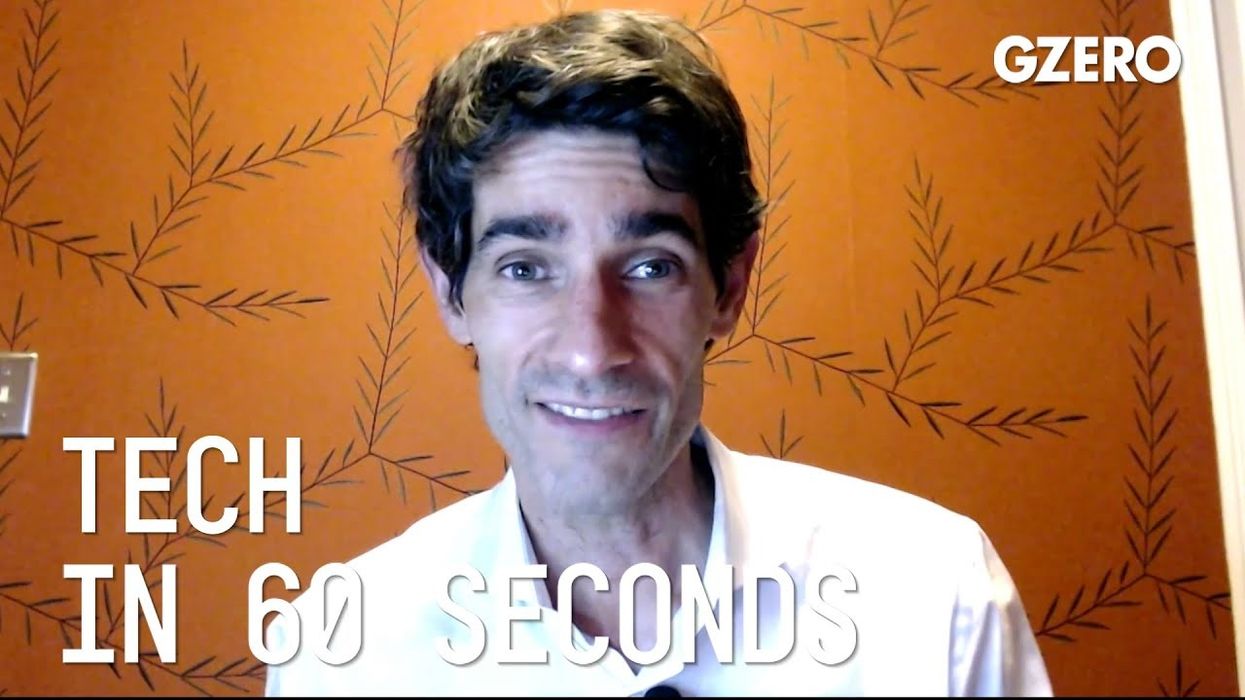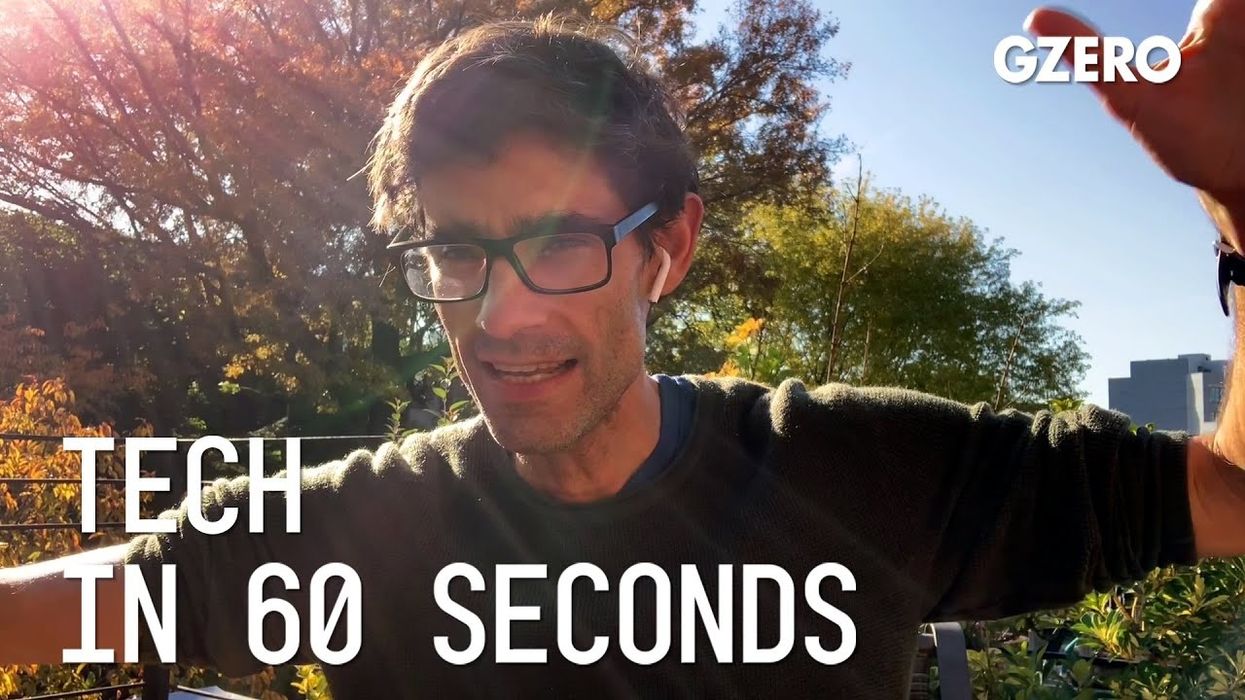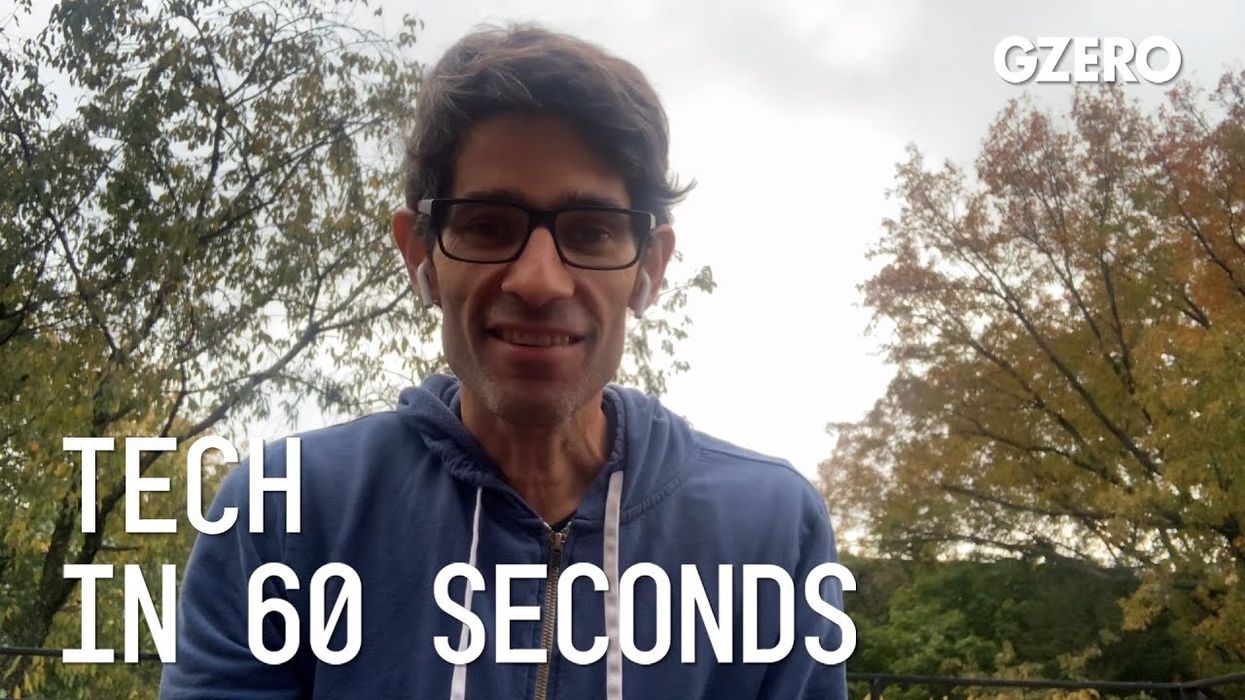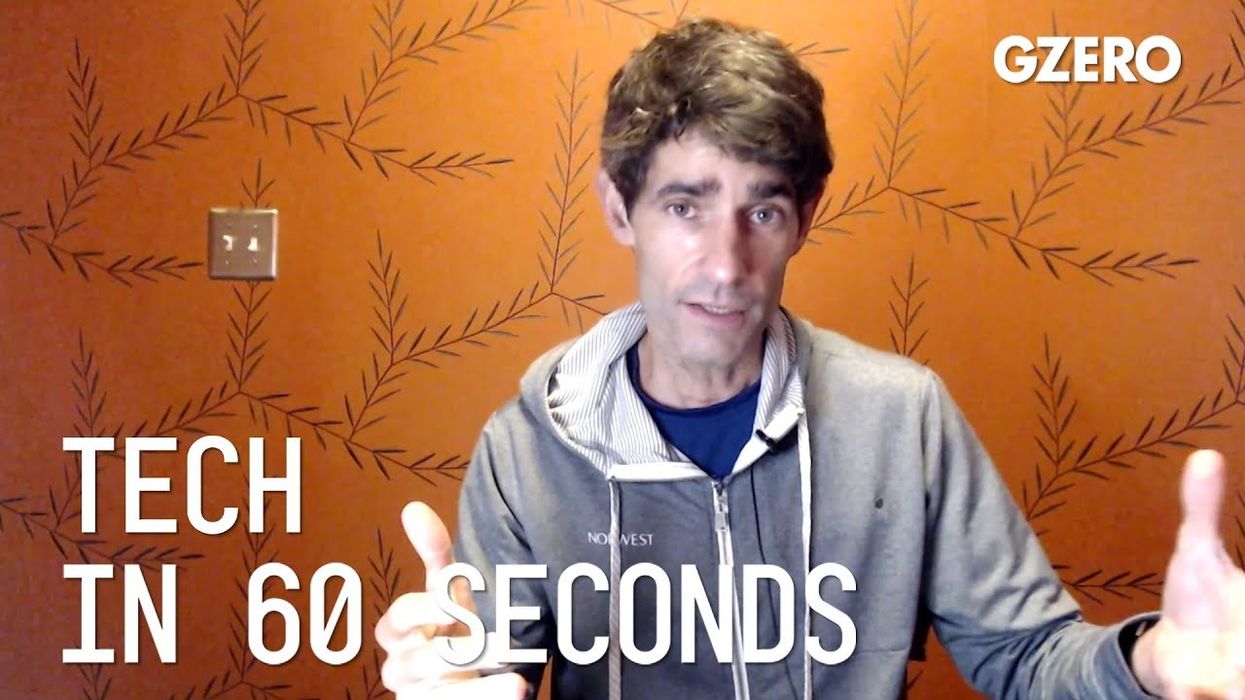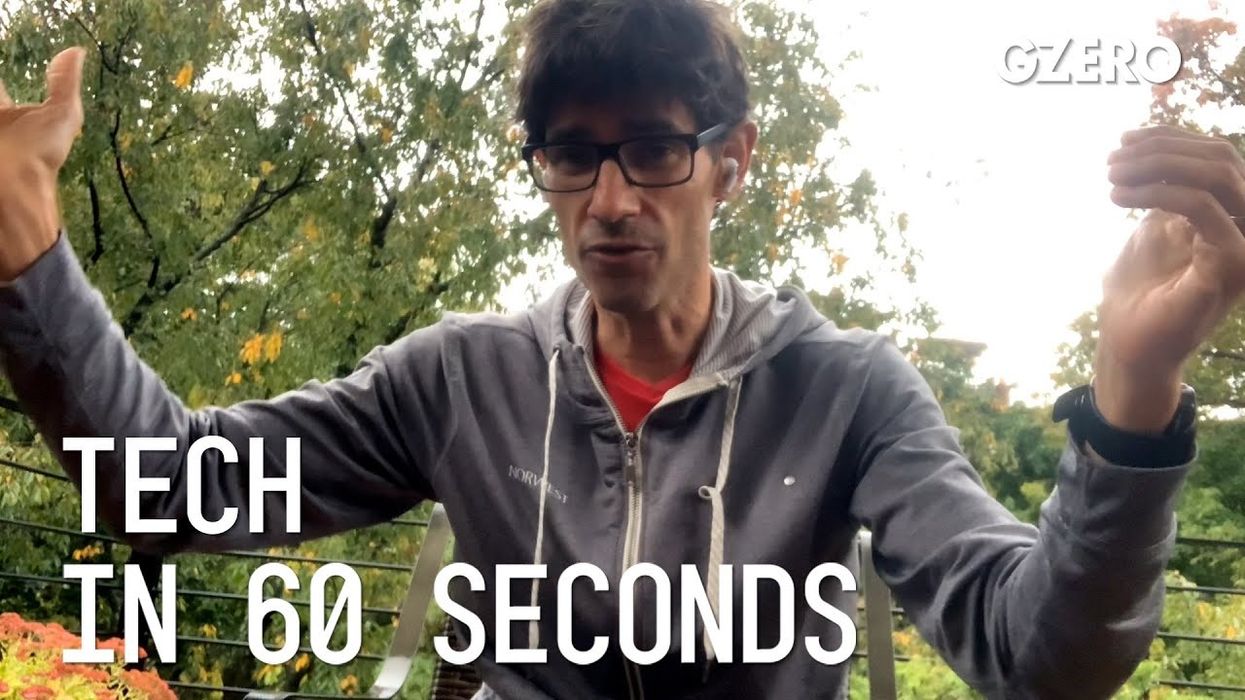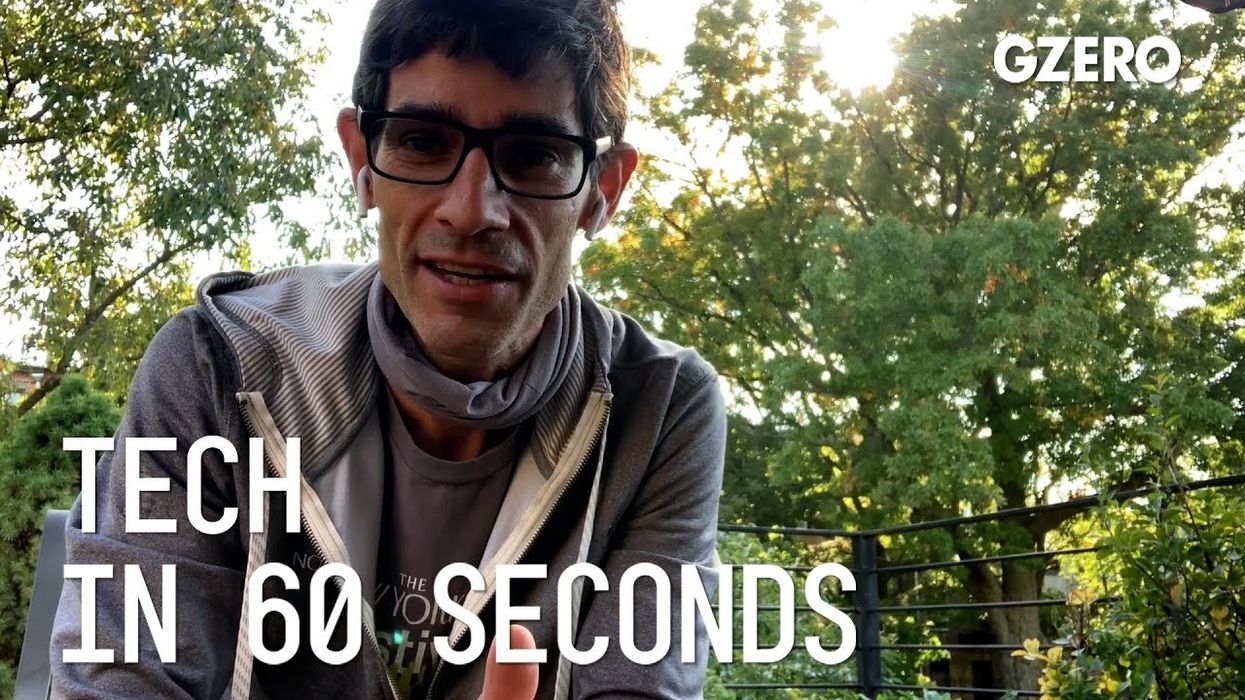Trending Now
We have updated our Privacy Policy and Terms of Use for Eurasia Group and its affiliates, including GZERO Media, to clarify the types of data we collect, how we collect it, how we use data and with whom we share data. By using our website you consent to our Terms and Conditions and Privacy Policy, including the transfer of your personal data to the United States from your country of residence, and our use of cookies described in our Cookie Policy.
Tech
Nvidia logo in Taipei, Taiwan.
4 billion: Salesforce is investing $4 billion in the United Kingdom and opening a 40,000-square-foot AI-focused office in London on June 18. The US-based software company said it’ll also run training and upskilling programs for professionals looking to gain AI-related skills.
6 million: Want a 90-second eye exam without interacting with a human? The startup Eyebot raised $6 million for AI-enabled kiosks that’ll do just that. The kiosks perform an eye exam, evaluate prescription lenses or contacts, and any recommended prescriptions are sent to a doctor for final review and approval. The company hopes that this telehealth initiative can be an affordable way for people to get their vision checked, especially those without easy access to professionals.
600,000: There are now 600,000 millionaires in the US, thanks to the AI boom. Atop an AI-fueled stock market boom, America’s number of millionaires jumped more than 7% year over year in 2023. Asia gained about 5% more millionaires while Europe saw a 4% increase.
471 billion: Apple’s stock has rallied since early April, gaining 20% — or $471 billion — in value on the back of investor anticipation of AI rollouts on its devices. The company kicked off its Worldwide Developers Conference on June 10, announcing Apple Intelligence, an AI upgrade to its iPhones that will prioritize certain messages and notifications, offer new writing tools, and boost Siri’s capability as a voice-powered assistant.Watch as Nicholas Thompson, editor-in-chief of WIRED, explains what's going on in technology news:
What is Parler? Why are people moving off Facebook to new social sites?
Parler is like Twitter, except it was set up very specifically to make it so that the owners of the site, the people who run it, would not censor your speech, or put another way, would not take action to remove hateful or harmful speech. It is a free speech social media platform that is primarily used by people on the political right. Why are people moving off Facebook to new social sites? I don't think that many are. People talk about moving off, but to the extent they are, it's because they feel like the sites are censoring them.
The US government said the election was the most secure in American history. Do you agree? How did we get here after the failures of 2016?
It was quite secure. We don't know for sure how we'll evaluate it a year from now. The way we got there is we saw the catastrophe of 2016. A lot of smart, dedicated people took corrective action.
Nicholas Thompson, editor-in-chief of WIRED, discusses technology industry news today:
Why do some states get their absentee ballots counted more quickly?
Well, it's a federalist country. States make their own voting rules. Some states started counting the absentee ballots as soon as they came in. Other states, much later. So, Florida pretty much had it done right at the beginning, which is why we had Florida results early on, which was very good for Donald Trump. Alaska doesn't even start to count them until they've all been received, which is why we have no idea how Alaska voted, though it also probably voted for Trump.
The PlayStation 5, is it going to transform gaming?
The early reviews of the PS5 are very good. There's some critique of its design and its size, but people like the power, the speed, the graphics, the stuff that really matters. Important question for me is, am I going to get one for my kids? I love playing FIFA on the PS4 against my six-year-old. We are dead even. PS5? Might be a little much.
Nicholas Thompson, editor-in-chief of WIRED, helps us make sense of today's stories in technology:
What are the biggest tech questions that will be facing the next president after the election and will they do anything about them?
I think the biggest question might be the digital divide. In an era of the pandemic where schools are online, medicine is moving online, work is moving online. It is a tragedy that there are 160 million people in this country who do not have good broadband access. And that's a failure of policy in many, many ways. That is a huge issue. I also think the tech dynamics with China are a huge issue, and I think that figuring out the government's role in regulating and supporting startups in artificial intelligence is huge. Will the candidates do anything about them? Joe Biden might do something about the digital divide. Donald Trump has actually been okay on AI, but tech policy has been a disaster under Trump and probably won't be a priority under Biden.
What happened at the Section 230 hearings this week?
Well, one thing that didn't happen, we didn't talk about Section 230. A total missed opportunity for the Senate to actually debate and reconfigure a really important law that is foundational to the internet. But it is a partisan moment, a few days before election, and sadly, it's what I expected.
Nicholas Thompson, editor-in-chief of WIRED, helps us make sense of today's stories in technology:
Why is the Department of Justice suing Google?
Well, they are suing Google because Google is a giant, massive company that has a dominant position in search. In fact, on your phone, you almost can't use any other search engine or at least your phone is preloaded with Google as a search engine and you probably don't know how to change it. The Department of Justice alleges that Google has used its power and its muscle to maintain its position, and that violates the antitrust laws.
Goodbye Quibi. Why did the video streaming platform fail?
Well, Quibi failed in part because of timing, it launched right at the start of the pandemic, which was very, very hard. Secondly, they just didn't have the right content, nothing seemed magical. And third, they made a bunch of tactical errors. They didn't allow people to screenshot and share stuff from the videos they saw. They weren't available on every platform. They made some mistakes. And now, unfortunately, they're gone.
Nicholas Thompson, editor-in-chief of WIRED, shares his perspective on technology news in Tech In (a little over) 60 Seconds:
What is the deal with Twitter and Facebook censoring a New York Post story on Hunter Biden?
The New York Post ran a story on Hunter Biden. It may have been entirely false. It may have been hacked. Both of those things are problems. But the complicated thing is when the story ran, nobody at Facebook and nobody at Twitter knew whether it was false or whether it had been hacked. The two companies responded in different ways. Facebook said, we're just going to down-rank it. Twitter initially said, "we just won't let it be shared." Twitter then backtracked. Basically, there is a really hard problem of what you do with false information and what you do with hacked information. Neither company has totally clear policies and both got caught in the slipstream.
Was the censoring of the New York Post story the catalyst for the FCC's public statements to rewrite Section 230?
Yes, absolutely. So Section 230 is the very important Internet law that allows the tech companies to filter content on their platforms. It essentially says, hey, if you run a platform, whether it's Facebook, Twitter or a Web site comments, you are not responsible for comments and for content that other people post there. And not only that, you have the ability to within certain limits, censor, change, edit the content out there without becoming a publisher and becoming liable. So that is partly what has allowed the tech companies to do what they do. It's allowed them to thrive and it's also allowed them to have policies policing misinformation or false statements on their platforms. So, Donald Trump got very mad at it, and so Ajit Pai, the head of the FCC, said, "hey, we're going to look at Section 230 and interpret it." In my opinion, that's garbage. Section 230 may be a bad law. It may be bad that the tech companies filter content on their platforms, whatever. I don't see how the FCC has the authority to deal with that. It is a law that gets interpreted by the courts. So, Congress can change the law, or the courts can change the interpretation of the law. I don't see why the FCC has authority, but who knows? It's just my guess, Ajit Pai is trying to please Donald Trump.
Watch as Nicholas Thompson, editor-in-chief of WIRED, explains what's going on in technology news:
How likely will big tech companies Apple, Amazon, Facebook, and Google be forced to breakup as recommended by Democrats on the House Judiciary Subcommittee on Antitrust?
I think it's pretty unlikely. I think there will be hearings. I think there will be damages. I think that there will be scrutiny on future mergers. I don't think there will be breakups.
"Hi, Speed." What can we expect from this week's annual Apple release?
Apple has a new phone most likely coming out next week. The motto is "Hi, Speed." I think it's going to be mostly about 5G. These phones will be 5G compatible. It doesn't mean the 5G infrastructure has been built up in this country or most other countries. But still, when it is, the phones will be fast. Also, I think the LiDAR sensors that were built on the last iPad, which was kind of a small announcement that people didn't really notice, will be on the new iPhone and that will be great for augmented reality.
